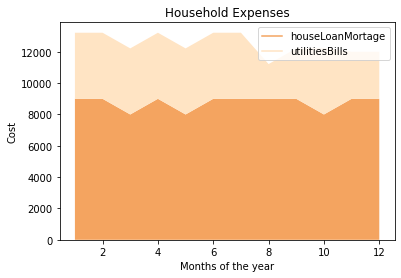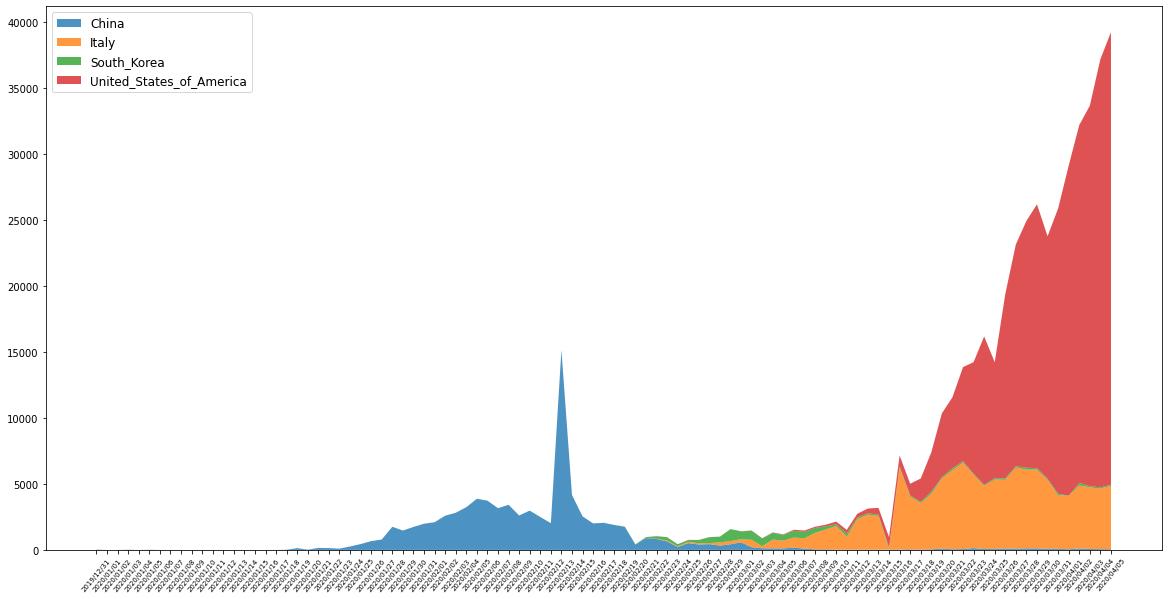matplotlib 04 area and stacked plot
강의 홍보
- 취준생을 위한 강의를 제작하였습니다.
- 본 블로그를 통해서 강의를 수강하신 분은 게시글 제목과 링크를 수강하여 인프런 메시지를 통해 보내주시기를 바랍니다.
스타벅스 아이스 아메리카노를 선물로 보내드리겠습니다.
- [비전공자 대환영] 제로베이스도 쉽게 입문하는 파이썬 데이터 분석 - 캐글입문기

공지
제 수업을 듣는 사람들이 계속적으로 실습할 수 있도록 강의 파일을 만들었습니다. 늘 도움이 되기를 바라며. 참고했던 교재 및 Reference는 꼭 확인하셔서 교재 구매 또는 관련 Reference를 확인하시기를 바랍니다.
도움이 되었다면 Github에 Star를 눌러주세요.
I. Matplotlib & Seaborn
(1) 기본 개요
Matplotlib는 파이썬 표준 시각화 도구라고 불리워지며 파이썬 그래프의 기본 토대가 된다고 해도 무방하다. 객체지향 프로그래밍을 지원하므로 세세하게 꾸밀 수 있다.
Seaborn 그래는 파이썬 시각화 도구의 고급 버전이다. Matplotlib에 비해 비교적 단순한 인터페이스를 제공하기 때문에 초보자도 어렵지 않게 배울 수 있다.
(2) matplotlib & Seabon 설치
설치방법은 윈도우 명령 프롬프트, MacOS, Linux 터미널에서 pip install matplotlib입력하면 되지만, 간혹 여러 환경에 따라 달라질 수 있으니 관련 싸이트에서 확인하기를 바란다.
- matplotlib 설치 방법: https://matplotlib.org/users/installing.html
- seaborn 설치 방법: https://seaborn.pydata.org/installing.html
II. Area and Stacked Plot
위 그래프를 사용할 때에는 다양한 변수의 소위 누적 효과(cumulative effect)를 보여줄 수 있다는 장점이 있다.
먼저 Line Graph를 작성한 후 각각의 변수에 따라 어떤 차이가 있는지 확인한다. 그래프를 작성해보자.
# 데이터 값 생성
houseLoanMortage = [9000, 9000, 8000, 9000,
8000, 9000, 9000, 9000,
9000, 8000, 9000, 9000]
utilitiesBills = [4218, 4218, 4218, 4218,
4218, 4218, 4219, 2218,
3218, 4233, 3000, 3000]
# 시각화를 위한 모듈 불러오기
import matplotlib.pyplot as plt
import seaborn as sns
# 각 변수의 길이에 맞도록 지정 (월이라고 가정해보자)
months = [x for x in range(1, 13)]
# plot 기본 세팅, 색상 지정
plt.plot([], [], color = 'sandybrown', label = 'houseLoanMortage')
plt.plot([], [], color = 'bisque', label = 'utilitiesBills')
# stack 그래프 추가
plt.stackplot(months, houseLoanMortage, utilitiesBills,
colors = ['sandybrown', 'bisque'])
plt.legend()
# 라벨 추가
plt.title('Household Expenses')
plt.xlabel('Months of the year')
plt.ylabel('Cost')
plt.show()

소스 코드상으로 어려운 것은 아마 없을 것이다. 다만 해석에 조금 유의할 필요는 있다. 위 그래프는 월별 전체 누적 그래프인데, houseLoanMortage와 utilitiesBills 사이에 어떤 항목이 지출이 큰 부분인지를 확인할 수 있을 것이다.
이러한 그래프는 특히 시계열과 그래프를 작성하는 데, 비교군이 존재할 때 매우 유용한 그래프라고 할 수 있다.
III. 코로나 시각화 Area Plot 예제
이번에는 이슈가 되고 있는 코로나 데이터를 통해 그래프를 작성해본다.
import pandas as pd
from tabulate import tabulate
url = 'https://raw.githubusercontent.com/chloevan/datasets/master/covid_19/covid_19.csv'
covid_19 = pd.read_csv(url)
print(tabulate(covid_19.head(), tablefmt="pipe", headers="keys"))
| | dateRep | day | month | year | cases | deaths | countriesAndTerritories | geoId | countryterritoryCode | popData2018 |
|---:|:-----------|------:|--------:|-------:|--------:|---------:|:--------------------------|:--------|:-----------------------|--------------:|
| 0 | 2020/04/05 | 5 | 4 | 2020 | 35 | 1 | Afghanistan | AF | AFG | 3.71724e+07 |
| 1 | 2020/04/04 | 4 | 4 | 2020 | 0 | 0 | Afghanistan | AF | AFG | 3.71724e+07 |
| 2 | 2020/04/03 | 3 | 4 | 2020 | 43 | 0 | Afghanistan | AF | AFG | 3.71724e+07 |
| 3 | 2020/04/02 | 2 | 4 | 2020 | 26 | 0 | Afghanistan | AF | AFG | 3.71724e+07 |
| 4 | 2020/04/01 | 1 | 4 | 2020 | 25 | 0 | Afghanistan | AF | AFG | 3.71724e+07 |
위 데이터에서 이제, 대표적인 국가만 출력하는 것으로 한다. 그럴려면 국가를 알아야 하기 때문에, 국가만 출력하도록 해보자. unique() 함수를 사용해서 구해본다.
covid_19['countriesAndTerritories'].unique()
array(['Afghanistan', 'Albania', 'Andorra', 'Algeria', 'Angola',
'Anguilla', 'Antigua_and_Barbuda', 'Argentina', 'Armenia', 'Aruba',
'Australia', 'Austria', 'Azerbaijan', 'Bahamas', 'Bahrain',
'Bangladesh', 'Barbados', 'Belarus', 'Belgium', 'Belize', 'Benin',
'Bermuda', 'Bhutan', 'Bolivia',
'Bonaire, Saint Eustatius and Saba', 'Bosnia_and_Herzegovina',
'Botswana', 'Brazil', 'British_Virgin_Islands',
'Brunei_Darussalam', 'Bulgaria', 'Burkina_Faso', 'Burundi',
'Cambodia', 'Cameroon', 'Canada', 'Cape_Verde',
'Cases_on_an_international_conveyance_Japan', 'Cayman_Islands',
'Central_African_Republic', 'Chad', 'Chile', 'China', 'Colombia',
'Congo', 'Costa_Rica', 'Cote_dIvoire', 'Croatia', 'Cuba',
'Curaçao', 'Cyprus', 'Czech_Republic',
'Democratic_Republic_of_the_Congo', 'Denmark', 'Djibouti',
'Dominica', 'Dominican_Republic', 'Ecuador', 'Egypt',
'El_Salvador', 'Equatorial_Guinea', 'Eritrea', 'Estonia',
'Eswatini', 'Ethiopia', 'Falkland_Islands_(Malvinas)',
'Faroe_Islands', 'Fiji', 'Finland', 'France', 'French_Polynesia',
'Gabon', 'Gambia', 'Georgia', 'Germany', 'Ghana', 'Gibraltar',
'Greece', 'Greenland', 'Grenada', 'Guam', 'Guatemala', 'Guernsey',
'Guinea', 'Guinea_Bissau', 'Guyana', 'Haiti', 'Holy_See',
'Honduras', 'Hungary', 'Iceland', 'India', 'Indonesia', 'Iran',
'Iraq', 'Ireland', 'Isle_of_Man', 'Israel', 'Italy', 'Jamaica',
'Japan', 'Jersey', 'Jordan', 'Kazakhstan', 'Kenya', 'Kosovo',
'Kuwait', 'Kyrgyzstan', 'Laos', 'Latvia', 'Lebanon', 'Liberia',
'Libya', 'Liechtenstein', 'Lithuania', 'Luxembourg', 'Madagascar',
'Malawi', 'Malaysia', 'Maldives', 'Mali', 'Malta', 'Mauritania',
'Mauritius', 'Mexico', 'Moldova', 'Monaco', 'Mongolia',
'Montenegro', 'Montserrat', 'Morocco', 'Mozambique', 'Myanmar',
'Namibia', 'Nepal', 'Netherlands', 'New_Caledonia', 'New_Zealand',
'Nicaragua', 'Niger', 'Nigeria', 'North_Macedonia',
'Northern_Mariana_Islands', 'Norway', 'Oman', 'Pakistan',
'Palestine', 'Panama', 'Papua_New_Guinea', 'Paraguay', 'Peru',
'Philippines', 'Poland', 'Portugal', 'Puerto_Rico', 'Qatar',
'Romania', 'Russia', 'Rwanda', 'Saint_Barthelemy',
'Saint_Kitts_and_Nevis', 'Saint_Lucia',
'Saint_Vincent_and_the_Grenadines', 'San_Marino', 'Saudi_Arabia',
'Senegal', 'Serbia', 'Seychelles', 'Sierra_Leone', 'Singapore',
'Sint_Maarten', 'Slovakia', 'Slovenia', 'Somalia', 'South_Africa',
'South_Korea', 'Spain', 'Sri_Lanka', 'Sudan', 'Suriname', 'Sweden',
'Switzerland', 'Syria', 'Taiwan', 'Thailand', 'Timor_Leste',
'Togo', 'Trinidad_and_Tobago', 'Tunisia', 'Turkey',
'Turks_and_Caicos_islands', 'Uganda', 'Ukraine',
'United_Arab_Emirates', 'United_Kingdom',
'United_Republic_of_Tanzania', 'United_States_of_America',
'United_States_Virgin_Islands', 'Uruguay', 'Uzbekistan',
'Venezuela', 'Vietnam', 'Zambia', 'Zimbabwe'], dtype=object)
여기에서 South_Korea, China, Italy, United_States_of_America 이렇게 4개 국가만 날짜별로 어떻게 달라지는지 확인해본다.
먼저 isin()을 활용해서 데이터 전처리를 해서 새로운 데이터를 만든다.
from tabulate import tabulate
new_data = covid_19[covid_19['countriesAndTerritories'].isin(['South_Korea', 'China', 'Italy', 'United_States_of_America'])].reset_index(drop = True)
temp = new_data.head()
print(tabulate(temp, tablefmt="pipe", headers="keys"))
| | dateRep | day | month | year | cases | deaths | countriesAndTerritories | geoId | countryterritoryCode | popData2018 |
|---:|:-----------|------:|--------:|-------:|--------:|---------:|:--------------------------|:--------|:-----------------------|--------------:|
| 0 | 2020/04/05 | 5 | 4 | 2020 | 48 | 3 | China | CN | CHN | 1.39273e+09 |
| 1 | 2020/04/04 | 4 | 4 | 2020 | 62 | 4 | China | CN | CHN | 1.39273e+09 |
| 2 | 2020/04/03 | 3 | 4 | 2020 | 70 | 10 | China | CN | CHN | 1.39273e+09 |
| 3 | 2020/04/02 | 2 | 4 | 2020 | 100 | 6 | China | CN | CHN | 1.39273e+09 |
| 4 | 2020/04/01 | 1 | 4 | 2020 | 54 | 1 | China | CN | CHN | 1.39273e+09 |
# stack 그래프를 작성하기 위해 데이터를 피벗을 해줘야 한다.
plotDF = new_data.set_index(['dateRep','countriesAndTerritories'])['cases'].unstack(fill_value=0)
print(tabulate(plotDF.head(), tablefmt="pipe", headers="keys"))
| dateRep | China | Italy | South_Korea | United_States_of_America |
|:-----------|--------:|--------:|--------------:|---------------------------:|
| 2019/12/31 | 27 | 0 | 0 | 0 |
| 2020/01/01 | 0 | 0 | 0 | 0 |
| 2020/01/02 | 0 | 0 | 0 | 0 |
| 2020/01/03 | 17 | 0 | 0 | 0 |
| 2020/01/04 | 0 | 0 | 0 | 0 |
이렇게 피벗이 완성이 된 이후에 그래프를 작성해본다.
plt.figure(figsize=(20,10))
plt.xticks(rotation=50, size=7)
plt.stackplot(plotDF.index,
[plotDF['China'], plotDF['Italy'],
plotDF['South_Korea'], plotDF['United_States_of_America']],
labels=['China', 'Italy', 'South_Korea', 'United_States_of_America'],
alpha=0.8)
plt.legend(loc=2, fontsize='large')
plt.show()

IV. 실습파일
- 구글코랩에서 빠르게 실습도 할 수 있습니다. 실습
V. Reference
Mukhiya, Uuresh Kumar. Ahmed Usman. Hands-on Exploratory Data Analysis With Python: Perform EDA Techniques to understand, Summarize, and Investigate Your Data. Packt publishing limited, 2020.
